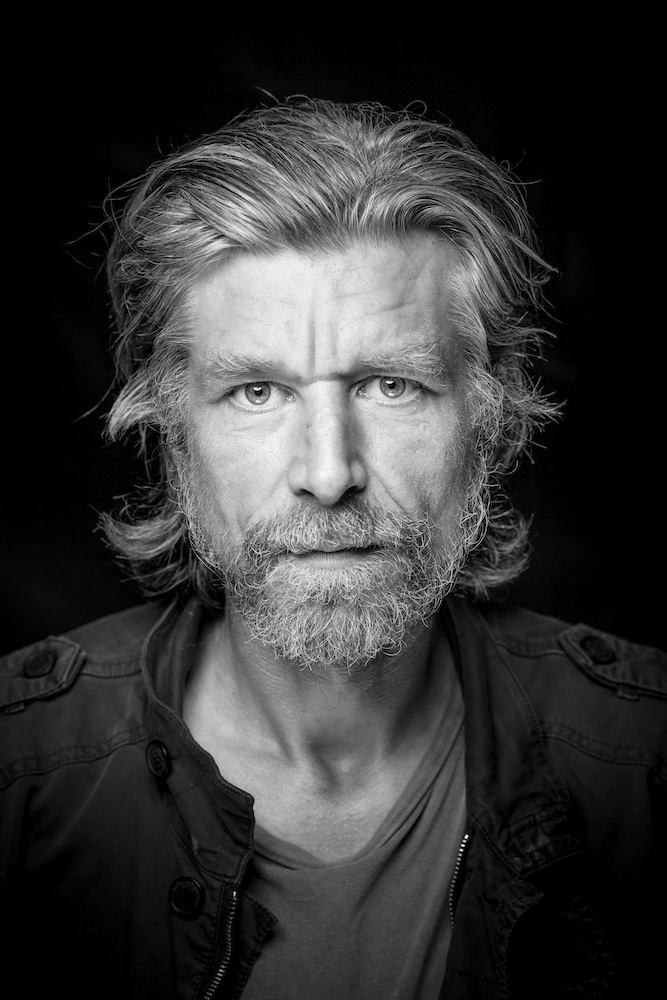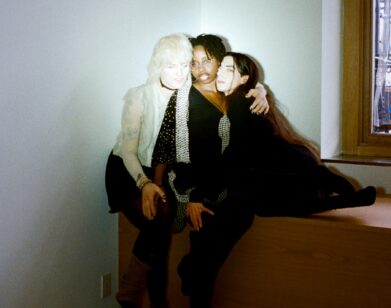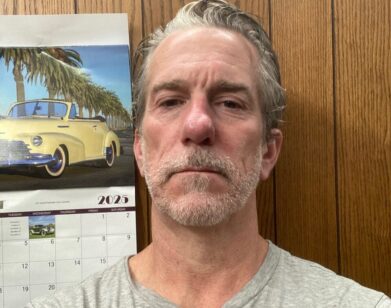In Search of Karl Ove Knausgaard

ABOVE: KARL OVE KNAUSGAARD. PHOTO COURTESY OF ANDRÉ LØYNING
It is a struggle to start Norwegian writer Karl Ove Knausgaard’s six-volume autobiographical novel, My Struggle (Min Kamp). The length is one deterrent, but there is the added challenge of dedicating so much reading time to the author as subject. Then there is the title, a direct reference to Hitler’s Mein Kampf.
Prior to My Struggle, Knausgaard published two other novels, both of which were highly praised in Scandinavia. Knausgaard’s 1998 debut Out of the World won the Norweigan Prize for Literature—a first for a first-time author—and 2004’s A Time to Every Purpose Under Heaven was awarded the Nordic Council’s Literature Prize. It is My Struggle, however, that is distinguishing Knausgaard internationally.
Yesterday, the English translation of My Struggle: Book Four came out via Archipelago Books. We spoke with Knausgaard over the phone about the challenges of the writing life, his book on soccer, and ignoring Bob Dylan’s lyrics.
JARED LEVY: What’s the experience of your day today?
KARL OVE KNAUSGAARD: It’s been a good day. My daughter’s participating in a musical. I drove her to rehearsal. It was such an extremely beautiful day with sunshine, spring, and green everywhere. I’m filled with life today.
I’m also working on a project at the moment where I’m writing one text each day. I’m supposed to do that through the year, so I have 365 texts in the end. Today I wrote two texts, which is a routine. I get up at 5 AM or 4:30 AM and I write one or two texts before the kids are awake. That’s a very good thing, just to start the day with. It’s only one page and I choose a word to write about.
LEVY: Each day you wake up and you write about one word?
KNAUSGAARD: Yes, that’s right. I was asked by the New Republic to write 400 words in each magazine for a year about something kind of funny that ends the magazine. I started that and the editor quit and everything changed, but I just kept continuing writing those texts. Then we decided to publish four books. The first book is going to be published in September and then one in November, one in February, and one in May, I think.
Today I wrote about plastic bags, which was a very good word to write about. And frames. I try to write about small insignificant things. I try to find out if it’s possible to say anything about them. And I almost always do if I sit down and write about something. There is something in that thing that I can write about. It’s very much like a rehearsal. An exercise, in a way.
LEVY: How do these assignments, the one you mentioned for the New Republic and your recent essay about the Viking origins of the Americas in The New York Times Magazine, impact your writing life?
KNAUSGAARD: When I started to write My Struggle everything changed: my way of writing changed; the speed of my writing changed; and what I was writing about changed. What I’ve been doing ever since is continuing the same kind of writing. When I did The New York Times piece I wrote 70 pages. They asked me to write 10. I couldn’t write it in 10, so I just wrote and wrote. It’s the same as the writing in My Struggle. It could have gone straight into one of the volumes. It’s a kind of repetition. It’s the same subject meeting new situations with the same tone, the same way of doing something a little essayistic, some description, and some failure. It’s a form of myself. It’s interesting to write something outside of the novel form.
This summer I did a football book with a friend. We wrote about the World Cup in Brazil. We exchanged letters through the summer and we published it. It’s 500 pages. It’s about football, but it’s also about everything else. In one way it’s a repetition of My Struggle, but in another sense it’s freedom. Just to sit down and write. I could never have done anything like that five or six years ago. That was completely impossible. Then, writing for me was something, not something sacred, but something you have. I couldn’t just sit down and write something. I had to work hard to make it into literature. Now, it’s much easier, but that works both ways. There’s a risk that it can become voiceless in the end.
Those pieces aren’t different for me. They’re the same. The writing and the thinking is still the same as it was in My Struggle. The only difference is that it is outside the form of the novel.
LEVY: Those describing My Struggle often talk about the novel’s length, but it seems to me that it could be much longer. How do you reduce the plentitude of moments in a composition about your life to a finite expression in six volumes?
KNAUSGAARD: That’s a difficult question. I never thought about my life when I was writing My Struggle. In a way, of course I was, but I was always thinking about the novel. What I realized, when I was writing this football book in the summer, is that that part of my life was completely absent in the childhood book, for instance. It was not there. I got questioned why and I think it’s because there are some premises that are made in the beginning of the novel that you follow. It’s not like I tried to make anything complete in any way. I just want to tell that single story. It’s got its own logic from the very beginning, from the first sentence. I never know where I’m going in the novel and that’s the only thing that can make it exciting enough to write about your own life.
LEVY: The novelistic sense constrains you, in a way, to tell a story that is finite within a life that continues. I’m sure there are ways in which you think about what you’ve written that changes and seems subject to revision.
KNAUSGAARD: Yeah. And I could easily imagine another novel set in the same time period of my life, which would be completely different.
LEVY: Something that jumped out to me in volume four, given my background and interests, is your relationship with music. In volume four, you wrote, “All I needed to know, all true knowledge, the only really essential knowledge, was to be found in the books I read and the music I listened to.”
You’re writing there about your adolescent perspective, though I imagine, just as I feel, that there is truth that the only things worth knowing are in music and written in books. This relates to the anecdote of you listening to Dungen in the first volume. I love Dungen, but I have no idea what they’re singing about, because I don’t understand Swedish. Is there anything on the lyrical level that speaks to you about Dungen’s music?
KNAUSGAARD: No, I actually seldom listen to lyrics when I’m listening to music. That’s very secondary to me when I’m listening to music. No, I just loved Dungen when I was writing that book. I don’t listen to them that much anymore, but I saw them live once a long time ago. They’re a brilliant band. But I don’t even listen to Bob Dylan’s lyrics…
LEVY: What other kind of reflections do you have on music’s relationship to writing?
KNAUSGAARD: I think there are a lot of similarities between writing and music. Music is much more direct and much more emotional and that’s the level I want to be at when I’m writing. Writing is much more intellectual and indirect and abstract, in a way. I’m not interested in those aspects of literature. I’m not interested in the words or the meaning of the words. I’m interested in disappearing in it completely, to not be aware of yourself at all. That’s the way music works for me. It’s purely emotional. It goes straight to the heart. There are no explanations. That’s just it.
I have a desire for that in writing as well. There’s a certain sense of rhythm in that. If you are disappearing from yourself, but you’re still writing, then there is a kind of activity of thinking going on, which in my world is similar to what’s going on in music. You don’t think when you play music, you just try to play and be in it. It is the same for me when the writing is going really well. It’s the same kind of feeling. I’m just in it. It’s not the words, it’s not the sentences, I’m not aware of it. Then it’s good.
LEVY: How do you go from the original sentiment, the original kind of “in it” in your native language, to having a work put out in the world in a different language, one that you speak and speak very well, but that is distant from the original being “in it?”
KNAUSGAARD: I never read the translation before publication. I was contacted about it in the beginning and I said I don’t want to read it. I wanted Don Bartlett to be completely free in his translation. The most important things for me is that the emotion is captured in such a way that the feelings that are in the original are there, much more than the details, if they are right or wrong. And it feels like that. When I’m reading aloud, it’s like it is the same. That for me is a sign of a brilliant translation.
I’ve had parts translated of other things that I’m writing by other translators, which have been a completely different experience, which I can instantly say, “This is wrong.” It isn’t like the words are wrong, it’s just the sense of it, it doesn’t evoke the same things; it doesn’t have the same tone, doesn’t have the same voice, and that’s pretty much in the details, I think. I think Bartlett has done a brilliant job. Those books had to be written very quickly and very fast and I hope the translation should have the same kind of flow, where you’re not afraid of mistakes, not afraid of banalities or things that are inadequate.
LEVY: Is that difficult for you when come in contact with your work translated in such a way that it doesn’t feel in the spirit of what you have done?
KNAUSGAARD: I think I’ve learned, because there have been many translations in many different languages, that the best I can do is have it how I want it in one place and that is in Norwegian. If it’s like that there than it is okay. That’s the best I can hope for.
LEVY: In closing, what is necessary for a healthy and successful writing life?
KNAUSGAARD: For me, personally, it is very important that the days are exactly the same, so I have routines. I do the same thing every day. The strange thing about writing is that it’s so easy to write a novel. It is really easy. But it’s getting there to the point where it’s easy that’s hard. The hard part is to get there.
I had a little bit of success with my first novel. That kind of fucked up my sense of who I was as a writer. I started to try to fulfill other people’s expectations and direct myself toward an image of myself, which made it impossible to write anything at all. I am in the same kind of a process now where I have to have a clean sheet to be able to write. And to do that you have to be able to do something where you risk yourself completely. There has to be a risk involved. The prospect of failing must be real. There needs to be something where the risk of failing is acute, in a way. It has to be for real. You can’t pretend.
MY STRUGGLE: VOLUME FOUR IS OUT NOW VIA ARCHIPELAGO BOOKS.






